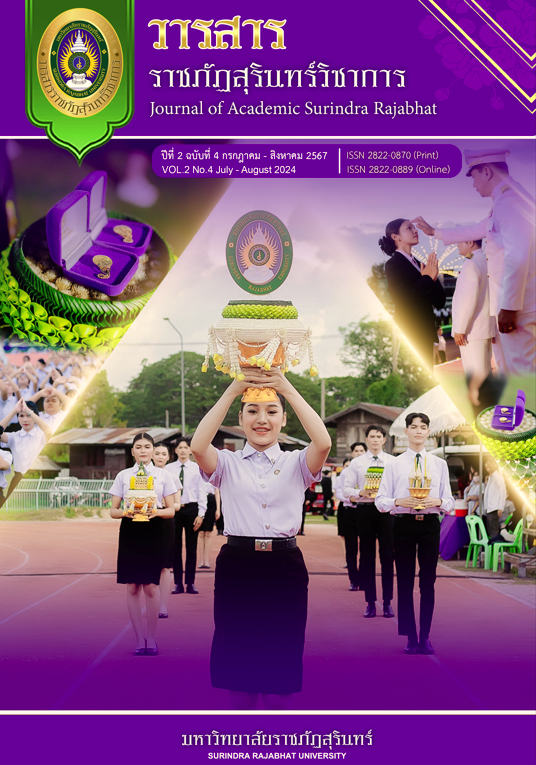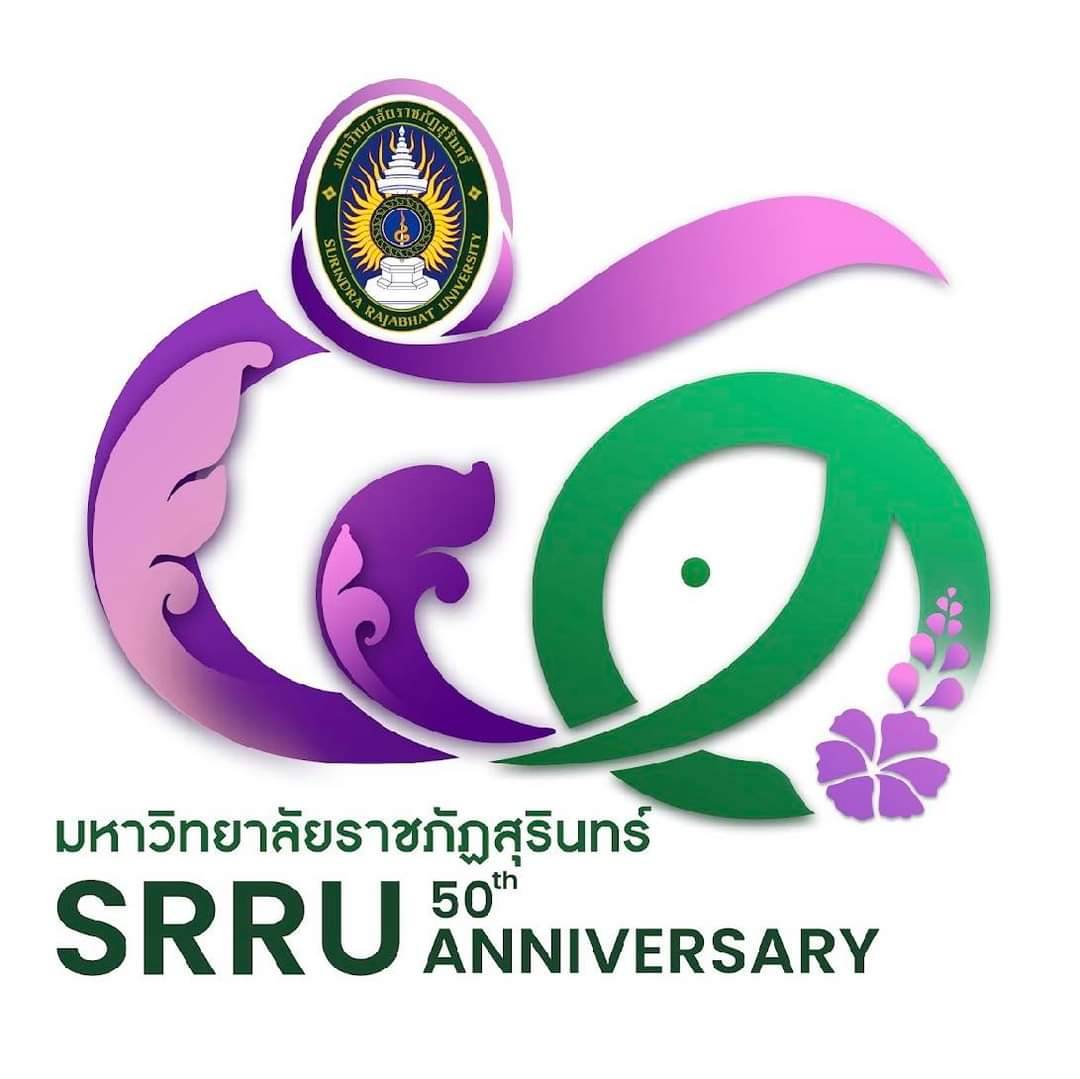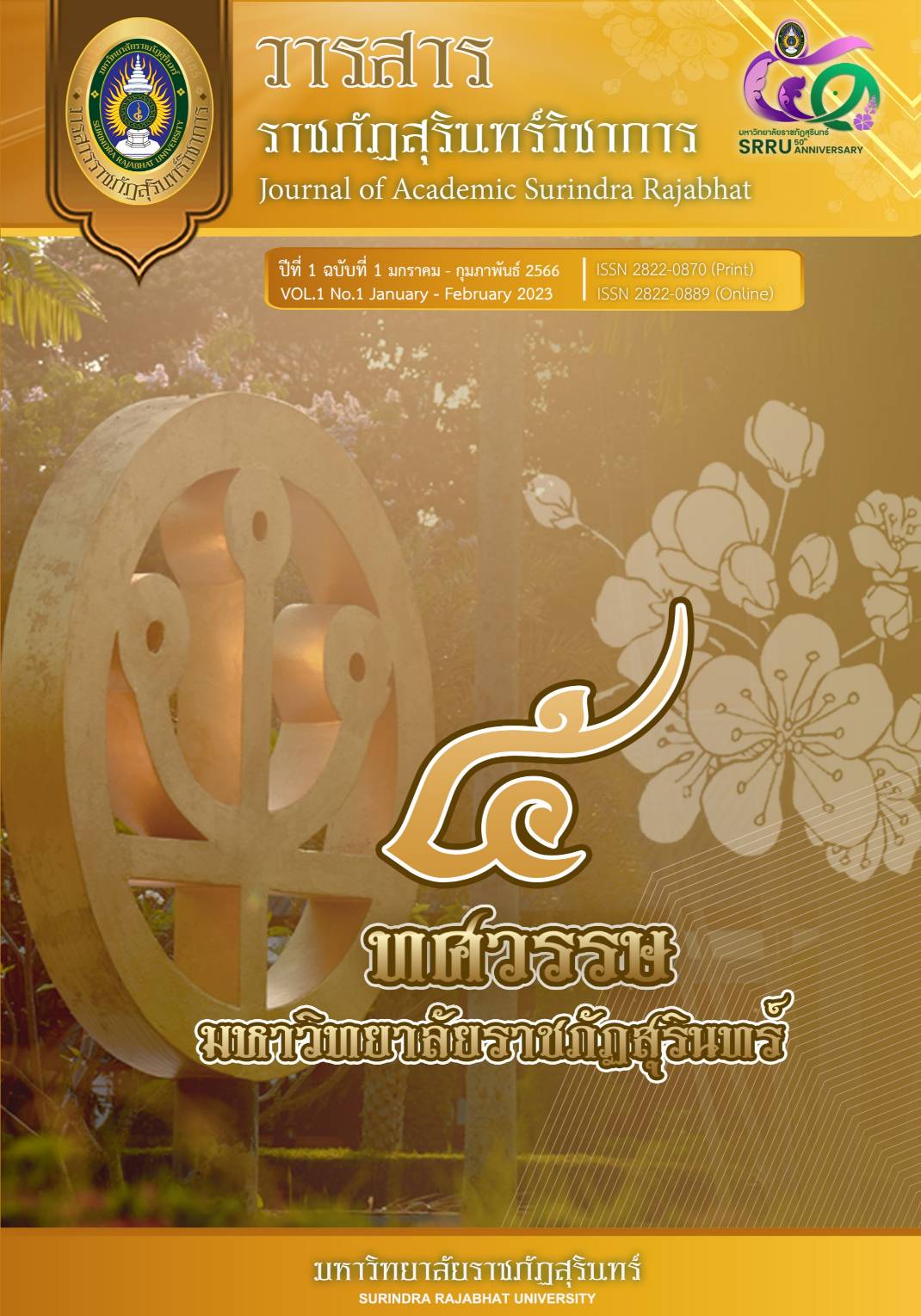Studying the Ability to Solve Mathematical Problems About Fraction Problems of Mathayom 1 Students, Emphasizing Drawing Strategies Together with Polya's Problem-Solving Process
DOI:
https://doi.org/10.14456/jasrru.2024.22Keywords:
Problem-Solving Ability, Problem-Solving Strategies, Polya's Problem-Solving ProcessAbstract
The objectives of this research are 1. To study the ability to solve mathematical problems about fraction problems of Mathayom 1 students, emphasizing drawing strategies together with Polya's problem-solving process with the criterion of 80 percent. 2. To compare skills in solving mathematical problems. about fraction problems before and after Used with emphasis on drawing strategies in conjunction with Polya's problem-solving process. of Mathayom 1 students
The research results found that: 1. Ability to solve mathematical problems about fraction problems of Mathayom 1 students, emphasizing drawing strategies together with Polya's problem-solving process. Meets the set criteria of 80 percent. 2. Mathematical problem-solving skills. About fraction problems by emphasizing drawing strategies together with Polya's problem-solving process, after class ( = 35.92, S.D. = 1.51 ) was higher than before class ( = 13.92, S.D. = 1.24 ), with statistical significance at the level. 05.
Downloads
References
กระทรวงศึกษาธิการ. (2560). หลักสูตรแกนกลางการศึกษาขั้นพื้นฐาน พุทธศักราช 2551 (ฉบับปรับปรุง พ.ศ.2560). กรุงเทพฯ : กระทรวงศึกษาธิการ.
ชูศรี วงศ์รัตนะ. (2560). เทคนิคการสร้างเครื่องมือวิจัย : แนวทางการนำไปใช้อย่างมืออาชีพ. กรุงเทพฯ : อมรการพิมพ์.
นางนิจวดี เจริญเกียรติบวร. (2558). เอกสารความรู้คณิตศาสตร์ "ยุทธวิธีช่วยคิดคณิตศาสตร์" เล่ม 2. กรุงเทพฯ : โรงพิมพ์องค์การสงเคราะห์ทหารผ่านศึก.
บุญชม ศรีสะอาด. (2545). การวิจัยเบื้องต้น. กรุงเทพฯ : สุวีริยาสาสน์.
ปานพระจันทร์ จันทร์พรหม. (2565). การศึกษาความสามารถในการแก้ปัญหาทางคณิตศาสตร์ของนักเรียนชั้นมัธยมศึกษาปีที่ 1 โดยใช้กระบวนการแก้ปัญหาตามแนวคิดของโพลยา. วารสารมนุษยศาสตร์และสังคมศาสตร์ มหาวิทยาลัยราชพฤกษ์. 8(1) : 327-243.
ล้วน สายยศ และอังคณา สายยศ. (2531). หลักการวิจัยทางการศึกษา. กรุงเทพฯ : ศึกษาพร.
วรรณิกา อ่อนน้อม และดุจเดือน ไชยพิชิต. (2564). การพัฒนาความสามารถในการแก้ปัญหาอย่างสร้างสรรค์ โดยใช้การจัดการเรียนรู้ตามกระบวนการแก้ปัญหาตามแนวคิดของโพลยา ของนักเรียนชั้นประถมศึกษาปีที่ 5. Journal of Roi Kaensarn Academi. 6(6) : 200-214.
วรางคณา สำอางค์, พรชัย ทองเจือ และผ่องลักษม์ จิตต์การูญ. (2560). การพัฒนาความสามารถในการแก้โจทย์ปัญหาของนักเรียนชั้นประถมศึกษาปีที่ 6 โดยการจัดการเรียนรู้ ตามแนวคิดโพลยา. วารสารมนุษยศาสตร์และสังคมศาสตร์ บัณฑิตวิทยาลัย มหาวิทยาลัยราชภัฏพิบูลสงคราม. 11(1) : 52-61.
สถาบันส่งเสริมการสอนวิทยาศาตร์และเทคโนโลยี. (2560). คู่มือการหลักสูตรกลุ่มสาระการเรียนรู้คณิตศาสตร์(ฉบับปรับปรุง พ.ศ. 2560). กรุงเทพฯ : ซีเอ็ดยูเคชั่น.
สถาบันส่งเสริมการสอนวิทยาศาสตร์และเทคโนโลยี. (2555). ทักษะและกระบวนการทางคณิตศาสตร์. กรุงเทพฯ : 3-คิวมีเดีย.
อริษา คำโหมด และสิทธิพล อาจอินทร์. (2562). การพัฒนาความสามารถในการแก้ปัญหาทางคณิตศาสตร์ ของนักเรียนชั้นมัธยมศึกษาปีที่ 6 โดยการจัดการเรียนรู้ด้วยวิธีการแบบเปิด (Open Approach) ร่วมกับกระบวนการแก้ปัญหาของโพลยา (Polya). วารสารศึกษาศาสตร ฉบับวิจัยบัณฑิตศึกษา มหาวิทยาลัยขอนแก่น. 13(2) : 95-105.
Anderson, K. B., & Pingry, R. E. (1973). Problem–solving in mathematics: Its theory and practice. Washington, DC : The National Council of Teachers of Mathematics.
Polya, G. (1967). How to Solve It. New Jersey : Princeton University.
Downloads
Published
How to Cite
Issue
Section
Categories
License
Copyright (c) 2024 Journal of Academic Surindra Rajabhat

This work is licensed under a Creative Commons Attribution-NonCommercial-NoDerivatives 4.0 International License.





















